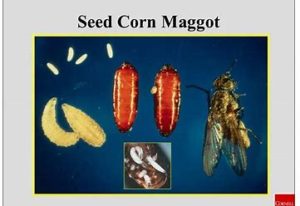Even though most people are focused on the pandemic, life on the farm still goes on. That also means, plant pests and crop production will be business as usual during the growing season. With the mild winter and earlier than usual warm springtime temperatures, many insect pests we often see in spring are emerging earlier than usual. One that has already been detected in Southern New Jersey is the seed corn maggot. This pest is about 2-3 weeks ahead of schedule in our region.

Eggs, larvae, pupae and adult flies of the Seed Corn Maggot, photo credit Cornell University
Seed corn maggot adult flies have been seen in Gloucester County this past week. As vegetable farmers begin planting crops affected by seed corn maggot (snap beans, lima beans, corn, turnips, peas, cabbage, and cucurbits – mainly squash and cucumber), it is important to use insecticidal seed treatments to protect these crops. Adult flies are most likely in other areas of New Jersey right now. Cool to moderate temperatures and wet weather increase activity and survivability of this early season pest. When adult maggots lay eggs near the planting hole, eggs can hatch in just a few days after being laid. Maggots then can burrow into seeds or seedlings, feed for a period of 2 to 3 weeks and then develop into egg-laying adults. There can be many generations per year, but activity is heightened during periods of cool and wet weather.
Adult flies are most abundant in fields with cover crops, soils with high organic matter, fields where leaves have been applied, fields that have just been tilled, or in fields that have had manure applied. When a seed or seedling is attacked, it may continue to grow, but will be weak and not produce a crop. Preventative control methods are most effective, since once larvae are found causing damage in the field, they are difficult to control underground. Some commercial insecticide seed treatments are available and to find products for individual crops see the 2020-2021 Mid-Atlantic Commercial Vegetable Production Recommendations guide. This information can be downloaded free at https://njaes.rutgers.edu/pubs/publication.php?pid=E001 .
Other preventative methods include row covers to create a barrier between the insect pest and the seeds or seedlings, waiting to plant in fields until soils and air temperatures are warm enough to quicken germination and plant growth, and selecting fields for early plantings with low organic matter and that do not remain wet for long periods.
Later in the season, even though this pest may be present, most crops can germinate and grow fast enough to overcome low numbers of larvae present in the field. When warmer temperatures and drier conditions occur seed corn maggot populations generally decrease.

